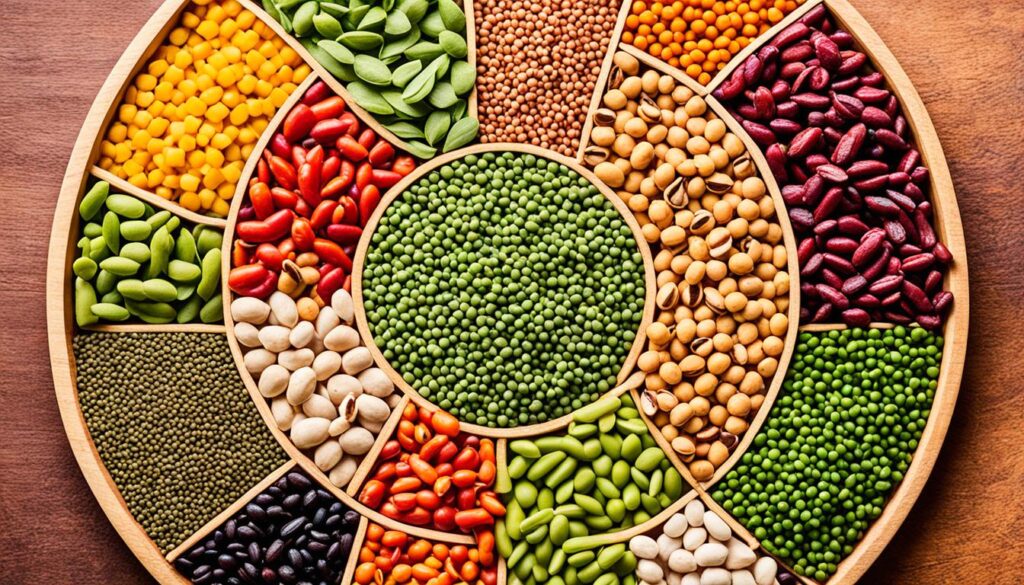Are you struggling to lose weight or feeling sluggish? Your metabolism could be holding you back. But what if you could rev up your metabolic engine with simple dietary changes? Discover the best foods that can help boost your metabolism and support your overall health.
Key Takeaways
- Protein-rich foods like lean meats, fish, eggs, and legumes can slightly increase your metabolic rate12
- Incorporating iron and selenium-rich foods supports proper thyroid function, which regulates metabolism2
- Spicy foods and chili peppers may temporarily boost calorie burn due to their capsaicin content123
- Caffeinated beverages like coffee and certain teas can help increase fat burning and metabolic rate2
- Staying hydrated with water can briefly boost metabolism by 24-30%23
What is Metabolism and Why It Matters
Metabolism is the complex process by which the body converts the food you consume into the energy needed for survival and proper functioning4. A healthy metabolism plays a crucial role in your overall well-being, as it determines how efficiently your body burns calories and utilizes nutrients4. Factors like age, muscle mass, physical activity, and genetics can all influence your metabolic rate, which is the number of calories your body burns at rest.
When your metabolism is working optimally, it can support your weight loss efforts and help you maintain a healthy weight4. On the other hand, a sluggish metabolism can make it more challenging to lose weight and may contribute to weight gain over time5. Fortunately, there are several steps you can take to boost your metabolism and improve your body’s energy-burning capabilities.
Metabolism and Weight Loss
Metabolism is closely tied to weight management4. Your basal metabolic rate (BMR), which is the number of calories your body needs to perform basic functions at rest, accounts for the largest portion of your total daily energy expenditure45. By increasing your muscle mass through strength training, you can boost your BMR and burn more calories, even at rest45.
In addition, the thermic effect of food, which is the energy required to digest and metabolize the nutrients you consume, can also play a role in weight management6. Protein, for example, requires more energy to metabolize than carbohydrates or fats, which means it can help increase your overall energy expenditure46.
By understanding the importance of metabolism and incorporating strategies to boost it, you can support your weight loss goals and improve your overall health and well-being45.
“A healthy metabolism is the foundation for overall well-being and can make weight loss efforts more successful.”
Protein-Rich Foods
Incorporating protein-rich foods into your diet can be an effective way to give your metabolism a boost. Foods high in protein, such as lean meats, fish, eggs, dairy, beans, legumes, nuts, and seeds, can slightly increase your metabolic rate due to their thermic effect7. This means your body burns a few more calories digesting and processing protein compared to fat and carbohydrates8.
Lean proteins like chicken, turkey, and fish are excellent choices, as they provide a sizable protein punch without excessive amounts of saturated fat9. Eggs, Greek yogurt, and cottage cheese are also fantastic protein-rich options that can support your metabolism9. Additionally, plant-based proteins from beans, lentils, nuts, and seeds can offer a metabolic boost while providing a range of other beneficial nutrients9.
When it comes to your daily protein intake, aim for 1.2 to 2 grams of protein per kilogram of your body weight8. This protein-rich range can help promote weight loss, maintain muscle mass, and support overall metabolic health8.
By making protein-rich foods a regular part of your diet, you can take advantage of their thermic effect and support a healthier, more efficient metabolism7. Incorporating a variety of lean proteins, dairy, and plant-based options can provide a well-rounded boost to your body’s calorie-burning potential9.
“Eating enough protein is crucial for maintaining a healthy metabolism and supporting weight management efforts.”
Iron and Selenium-Rich Foods
Proper thyroid function is crucial for regulating your metabolism, and minerals like iron and selenium play a vital role in this process10. To support your thyroid and metabolic health, it’s important to include a variety of iron-rich and selenium-rich foods in your diet.
The Importance of Iron and Selenium
Iron is essential for the production of thyroid hormones, which directly impact your metabolic rate10. Selenium, on the other hand, is necessary for converting the thyroid hormone T4 into the more active form, T3, which is crucial for proper thyroid function10. Additionally, selenium helps protect cells from oxidative stress and chronic diseases10.
Seafood, such as fish and shellfish, is an excellent source of both iron and selenium1011. Nuts, especially Brazil nuts, are also incredibly rich in selenium1011. Other iron-rich foods include lean meats, legumes, and seeds, while additional selenium-rich options include organ meats and certain plant-based foods11.
| Iron-Rich Foods | Selenium-Rich Foods |
|---|---|
|
|
It’s important to note that the selenium content in foods can vary depending on the selenium levels in the soil where the food was grown10. Areas with low selenium levels in the soil may correlate with a higher risk of thyroid disease10. Additionally, selenium works synergistically with other vitamins and minerals, such as B3, C, E, and zinc, to support overall health10.
By incorporating a variety of iron-rich and selenium-rich foods into your diet, you can help support your thyroid function and overall metabolic health101112.
Spicy Foods and Chili Peppers
Spicy foods, particularly those containing chili peppers, can be a powerful ally in boosting your metabolism. Chili peppers and other spicy ingredients contain a compound called capsaicin, which has been shown to provide a range of beneficial effects on the body’s metabolic processes13.
Studies have found that regularly consuming spicy foods, even just once a day, can lower mortality rates by 14 percent13. Certain spices like cumin, cinnamon, turmeric, peppers, and chilies can raise your metabolic resting rate and slow down your appetite13. Turmeric, for example, has been found to suppress fat tissue growth in mice13.
The capsaicin in chili peppers has been shown to provide protection against the ulcer pathogen H. pylori, act as a pain reliever, and even slow and destroy cancer cells13. Additionally, cumin and turmeric possess powerful antioxidant and antimicrobial properties13.
Incorporating spicy foods into your diet can offer a range of metabolic benefits. Regular consumption of foods with capsaicin may increase overall life expectancy by 13 percent14. Capsaicin has been found to impact fat oxidation, enhancing the body’s ability to break down and utilize fat for energy14. Studies have also suggested that the thermogenic effect of capsaicin can potentially reduce the risk of developing health conditions like metabolic syndrome, type 2 diabetes, and cardiovascular disease14.
Not all chili peppers are created equal, however. Different varieties offer varying levels of capsaicin, with cayenne pepper providing a concentrated source14. Paprika, on the other hand, may have a milder capsaicin content14. Spicy foods derived from chili peppers have thermogenic effects due to capsaicin, leading to increased heat production and metabolic rate14.
It’s important to note that some individuals may need to limit their intake of spicy foods due to gastrointestinal issues like acid reflux, GERD, or peptic ulcers14. Spicy foods can also be potential triggers for those with irritable bowel syndrome or heartburn14. While incorporating capsaicin from spicy foods into the diet is generally considered safe, high doses of capsaicin dietary supplements have been linked to severe health effects14.
Chili peppers have a rich history, originating from South and Central America and first being farmed in Mexico15. There are thousands of varieties of chili peppers, ranging in flavor from mild to extremely spicy, with larger peppers generally being less spicy than their smaller counterparts15. Some common types of chili peppers include Anaheim, Carolina reaper, Habanero, Jalapeno, Serrano, and Tabasco15.
Chili peppers are not only flavorful, but they are also packed with nutrients such as vitamin A, vitamin C, iron, and dietary fiber15. They are especially popular in Mexican, African, and Asian cuisines, and can be found in a variety of dishes worldwide, from Jerk chicken to Zulu sauce15. Incorporating chili peppers into your diet can not only boost your metabolism but also improve heart health, immune system function, and overall well-being15.
Caffeinated Beverages: Coffee and Tea
For those seeking a metabolic boost, caffeinated beverages like coffee and tea may offer a promising solution. The caffeine found in coffee, as well as the unique compounds present in tea, have been shown to potentially increase your metabolic rate and enhance fat oxidation, particularly when combined with exercise16.
Coffee is a popular source of caffeine, containing stimulants such as caffeine, theobromine, theophylline, and chlorogenic acid16. Studies suggest that caffeine can improve exercise performance by 11-12% on average16, and it can also raise your resting metabolic rate by 3-11%, with larger doses having a greater effect16. Additionally, coffee can increase fat burning by as much as 29% in lean individuals, while the increase is around 10% in obese individuals16.
Similarly, certain compounds found in tea, such as catechins, may also contribute to a temporary metabolic boost16. However, it’s important to note that people may build up a tolerance to the effects of caffeine over time16, and drinking coffee or other caffeinated beverages may be an ineffective weight-loss strategy in the long term due to this tolerance development16.
While the energy drink market has seen significant growth in recent years, reaching over $19 billion in sales last year17, these beverages can contain high amounts of caffeine, added sugars, and other potentially concerning ingredients17. It’s essential to be mindful of your caffeine intake and to choose healthier, regulated options that may offer additional metabolic benefits, such as certain energy drink brands that contain beneficial ingredients like vitamins, minerals, and antioxidants17.
In summary, the caffeine in coffee and the unique compounds in tea may provide a temporary metabolic boost, especially when combined with exercise. However, the long-term effects and individual responses to caffeine can vary, so it’s crucial to consume these beverages in moderation and choose options that align with your overall health and wellness goals161718.
Legumes and Beans
When it comes to providing a metabolic boost, legumes and beans are true all-stars. These nutrient-dense foods are packed with protein, fiber, and resistant starch – all of which play a crucial role in supporting a healthy, efficient metabolism19.
The high protein content in legumes requires your body to burn more calories to digest them, leading to a temporary increase in metabolic rate19. Fiber and resistant starch, on the other hand, help regulate blood sugar levels and feed the beneficial bacteria in your gut, further promoting metabolic efficiency1920.
- Lentils are rich in protein and may help increase metabolism20.
- Kidney beans are high in folate, supporting a healthy metabolic rate20.
- Tempeh, a fermented soy product, is high in protein and healthy fats, and contains beneficial probiotics for gut health, which supports efficient metabolism2021.
Beyond their macronutrient profile, certain legumes and beans also offer additional metabolism-boosting benefits. For instance, strawberries are rich in vitamin C, which can enhance fat burn and metabolism20. Avocados contain anti-inflammatory properties that can temporarily increase metabolic rate21.
| Food | Metabolism-Boosting Benefits |
|---|---|
| Lentils | High in protein, may help increase metabolism20 |
| Kidney Beans | High in folate, supporting a healthy metabolic rate20 |
| Tempeh | High in protein and healthy fats, contains beneficial probiotics for gut health, supporting efficient metabolism2021 |
| Strawberries | Rich in vitamin C, can enhance fat burn and metabolism20 |
| Avocados | Contain anti-inflammatory properties that can temporarily increase metabolic rate21 |
Incorporating a variety of legumes and beans into your diet can be a simple and delicious way to give your metabolism a natural boost. Whether you’re looking to support weight management efforts or simply improve overall metabolic health, these powerhouse foods should be a regular part of your meal planning192021.

Ginger and Other Metabolism-Boosting Spices
Ginger, grains of paradise, and other spices in the ginger family may offer a natural way to help boost your metabolism22. Research shows that adding half a teaspoon of ginger powder in hot water and drinking it with a meal may help burn up to 43 more calories22. These thermogenic spices can increase your body’s resting energy expenditure, meaning you can burn more calories even when you’re at rest23. Ginger consumption has been shown to enhance thermogenesis and increase metabolism in overweight individuals23.
In addition to ginger, other spices like cayenne and chili peppers may also provide a metabolic boost22. Cayenne and chili peppers contain capsaicin that can increase body metabolism by 15% to 20% by stimulating body heat2223. Research indicates that cayenne pepper can increase metabolism by up to five percent and fat oxidation by up to 16 percent23.
Turmeric, a key ingredient in curry powder, has also been linked to potential metabolism-boosting effects23. Turmeric consumption may reduce weight gain and total body fat by decreasing levels of insulin and leptin resistance2324. Turmeric with curcumin may support a healthy metabolism due to its anti-inflammatory and antioxidant properties24.
Incorporating these flavorful, metabolism-boosting spices into your meals and drinks can be a simple and delicious way to support your weight management efforts222324.
“Spices like ginger, cayenne, and turmeric can offer a natural way to support a healthy metabolism and provide other potential health benefits.”
Cacao and Dark Chocolate
While indulging in a square or two of dark chocolate may seem like an indulgence, recent studies suggest that cacao and dark chocolate can actually provide a metabolic boost25. Studies show that consuming 1.5 ounces of dark chocolate per day can lead to lower stress hormones and a more regulated metabolism due to the flavonoids contained in the chocolate25. Similarly, a 101-gram bar of dark chocolate with 70–85% cocoa solids provides a wealth of beneficial compounds, including flavanols, polyphenols, and theobromine26.
Cacao, the key ingredient in dark chocolate, is rich in fiber, iron, potassium, calcium, antioxidants, and other essential nutrients27. In fact, cacao contains more antioxidants per 100g than acai, goji berries, or blueberries27. These nutrient-dense compounds can help support a healthy metabolism, fight inflammation, and aid in muscle recovery27.
Additionally, cacao’s caffeine and theobromine content may help boost metabolism and reduce cravings, potentially aiding in weight loss efforts27. Studies have found that consumption of dark chocolate with at least 81% cocoa can significantly increase the success of weight loss diets27. Cacao is also high in protein, which can help keep you feeling full for longer, further supporting your metabolism-boosting goals27.
When incorporating cacao and dark chocolate into your diet, it’s important to opt for high-quality, minimally processed options with a high cocoa content. Raw cacao and dark chocolate with at least 70% cocoa solids are recommended for maximum health benefits26. While dark chocolate is a rich source of beneficial compounds, it’s still high in fat and sugar, so moderation is key26.

“Consuming almonds, dark chocolate, and cocoa may reduce the risk of coronary heart disease.”26
Medium-Chain Triglyceride (MCT) Oil
While many fats can contribute to weight gain, one type of fat, known as medium-chain triglycerides (MCTs), may actually offer some metabolic benefits28. MCT oil is a unique type of fat that can be more easily metabolized by the body and is less likely to be stored as body fat compared to long-chain triglycerides (LCTs)29.
Research suggests that incorporating MCT oil into your diet may help increase your metabolism and support fat-burning efforts28. MCT oil has about 10% fewer calories than long-chain triglycerides (LCTs)28, and an analysis of 29 studies found an association between MCTs and lower calorie intake when compared to LCTs28. Researchers have also reported that MCT oil could help reduce body weight and waist circumference28.
A review of 13 randomized controlled trials found that MCTs supported modest weight loss, fat loss, and reduced body size28. MCTs can be converted into ketones, providing a fat-based source of energy28, and MCT oil may help increase fat burning during exercise28. Studies suggest that athletes who took MCTs burned more fat during exercise28.
In addition to potential metabolic benefits, MCT oil has shown promise in managing certain health conditions28. One study found that adults with epilepsy who supplemented with MCT oil had 42% fewer seizures28.
While the research on MCT oil’s effects is promising, it’s important to note that the results may vary from person to person29. Doses of MCT oil range from 5–70 grams (0.17–2.5 ounces) daily for potential benefits29, and MCT oil can be consumed directly or added to food and drinks29.
If you’re looking to boost your metabolism and potentially support fat-burning, incorporating MCT oil into your diet may be worth considering. However, it’s always a good idea to consult with a healthcare professional before making significant changes to your diet or supplement routine30.
| Metric | MCT Oil | Olive Oil |
|---|---|---|
| Endpoint Body Weight | -1.67 ± 0.67 kg | N/A |
| Fat Mass Loss | Trend towards greater loss | N/A |
| Trunk Fat Mass | Lower | N/A |
| Total Fat Mass | Lower | N/A |
| Intraabdominal Adipose Tissue | Lower | N/A |
The study compared the effectiveness of a free-living weight-loss diet incorporating MCT consumption with one providing long-chain triglycerides (LCTs) from olive oil on weight loss and change in body composition30. The study was conducted over 16 weeks, and participants consumed 18–24 g/d of MCT oil or olive oil as part of a weight-loss program30.
“MCT oil may offer some metabolic benefits by increasing metabolic rate and being less likely to be stored as body fat.”
While the research on MCT oil’s effects is promising, it’s important to remember that the results may vary from person to person29. As with any dietary change or supplement, it’s always best to consult with a healthcare professional before incorporating MCT oil into your routine282930.
Staying Hydrated with Water
Staying properly hydrated is essential for maintaining a healthy metabolism. Research demonstrates that drinking water can briefly boost your metabolic rate by up to 30% due to the energy required to heat the water to body temperature, a process known as water-induced thermogenesis31. In fact, adequate water consumption is crucial for effectively metabolizing stored fat and carbohydrates32.
Females are recommended to consume around 9 cups of water daily, while males should aim for approximately 13 cups32. Replacing sugary or alcoholic beverages with water can also contribute to weight loss and reduced obesity over time32. Soups, liquid-based meals, fruits, and vegetables with high water content can further enhance your daily water intake32.
- A study involving 50 overweight females found that drinking 500 mL of water before meals for 8 weeks resulted in weight loss, reduced body fat, and decreased body mass index (BMI)32.
- Participants who drank water after lunch in a weight loss program lost 13.6% more weight than those who consumed diet beverages32.
- Drinking 200–250 mL or 6.8–8.5 oz of warm water after each meal led to more weight loss and a lower BMI compared to a control group33.
While water fasting can lead to rapid weight loss, it should be approached cautiously due to potential adverse effects32. Staying hydrated can support overall metabolic function and well-being, so make sure to drink plenty of water throughout the day31.

“Increased water intake was linked to increased lipolysis and fat loss in animal studies.”32
To summarize, maintaining proper hydration is essential for supporting a healthy metabolism. Drinking the recommended amount of water, replacing sugary beverages with water, and incorporating water-rich foods can all contribute to boosting your metabolic rate and supporting your overall health and well-being.
Iodine-Rich Seaweed
Seaweed is a remarkable superfood that offers a plentiful supply of iodine, a vital mineral for maintaining a healthy thyroid gland and regulating metabolism34. The recommended daily intake (RDI) of iodine is 150 mcg per day for most adults, with higher requirements for pregnant or nursing women34. Unfortunately, one-third of the population is at risk of iodine deficiency, particularly in areas with low iodine soil content34.
Fortunately, seaweed is an exceptional source of this essential nutrient. Kombu kelp contains up to 2,984 mcg of iodine per seaweed sheet (1 gram), providing almost 2,000% of the recommended daily intake34. Wakame seaweed has an average of 66 mcg of iodine per gram, about 44% of the daily recommended intake34. And nori seaweed has a varying iodine content between 16–43 mcg per gram, equivalent to 11–29% of the daily value34.
Incorporating iodine-rich seaweed into your diet can be a game-changer for your metabolic health. Seaweed is a veritable powerhouse when it comes to providing the iodine your body needs to maintain proper thyroid function and support a healthy metabolism35. In fact, a 10-gram serving of dried nori seaweed can contain up to 232 mcg of iodine, making it one of the best sources of this essential mineral35.
| Food | Iodine Content | Percentage of Daily Value |
|---|---|---|
| Kombu Kelp (1 gram) | 2,984 mcg | 1,989% |
| Wakame Seaweed (1 gram) | 66 mcg | 44% |
| Nori Seaweed (1 gram) | 16-43 mcg | 11-29% |
| Cod (3 ounces) | 63-99 mcg | 42-66% |
| Milk (8 ounces) | 85 mcg | 57% |
| Yogurt (8 ounces) | 116 mcg | 77% |
| Shrimp (3 ounces) | 35 mcg | 23% |
| Tuna (3 ounces) | 17 mcg | 11% |
| Egg (1 large) | 24 mcg | 16% |
| Prunes (5 dried) | 13 mcg | 9% |
| Lima Beans (1 cup, cooked) | 16 mcg | 10% |
Incorporating a variety of iodine-rich foods, such as seaweed, fish, dairy, and eggs, into your diet can help ensure you’re getting the optimal amount of this crucial mineral for maintaining a healthy thyroid and metabolism3536. By making seaweed a regular part of your meals, you can support your body’s metabolic functions and overall well-being.
“Seaweed is a remarkable superfood that offers a plentiful supply of iodine, a vital mineral for maintaining a healthy thyroid gland and regulating metabolism.”
The Best Foods to Boost Your Metabolism
Maintaining a healthy metabolism is crucial for supporting weight loss efforts and overall well-being. Fortunately, there are several top metabolism boosting foods that can be incorporated into your diet to help rev up your body’s calorie-burning capabilities.
Lean Proteins
Lean proteins, such as lean meats, fish, eggs, dairy, beans, legumes, nuts, and seeds, can slightly increase your metabolic rate due to their thermic effect37. The additional energy required to digest and metabolize protein-rich foods can contribute to a small boost in your overall metabolism.
Spicy Foods and Chili Peppers
Chili peppers contain capsaicin, a compound that can activate the TRPV1 receptor and impact metabolism and body weight38. Consuming spicy foods like chili peppers may also lead to increased feelings of satiety, helping to curb hunger and reduce calorie intake38.
Caffeinated Beverages
The caffeine in coffee and certain compounds in tea may help boost your metabolism and increase fat oxidation, especially when combined with exercise37. Drinking three to four cups of coffee per day has been associated with burning an extra 100 calories37.
Other Metabolism-Boosting Foods
- Legumes and beans, rich in protein and fiber, can contribute to weight loss efforts38.
- Ginger, grains of paradise, and other spices in the ginger family may help increase your body’s resting energy expenditure and promote feelings of fullness37.
- Cacao and dark chocolate contain compounds that may offer some metabolic benefits37.
- Medium-chain triglyceride (MCT) oil, a unique type of fat, may increase metabolic rate and be less likely to be stored as body fat37.
- Staying hydrated with water can slightly boost metabolism and prevent mistaking thirst for hunger39.
- Iodine-rich seaweed supports proper thyroid function and metabolic regulation37.
By incorporating these top metabolism boosting foods into your metabolism enhancing diet, you can support your body’s natural calorie-burning abilities and promote overall metabolic health.
“A healthy metabolism can support weight loss efforts and overall well-being.”
| Food | Metabolism-Boosting Benefits |
|---|---|
| Lean Proteins | Slightly increase metabolic rate due to the thermic effect of food (TEF)37 |
| Chili Peppers | Contain capsaicin that activates the TRPV1 receptor, impacting metabolism and body weight38 |
| Coffee and Tea | Caffeine and certain compounds may help boost metabolism and increase fat oxidation37 |
| Legumes and Beans | Rich in protein and fiber, contribute to weight loss efforts38 |
| Ginger and Spices | May increase resting energy expenditure and promote feelings of fullness37 |
| MCT Oil | Increases metabolic rate and is less likely to be stored as body fat37 |
| Water | Slightly boosts metabolism and prevents mistaking thirst for hunger39 |
| Seaweed | Rich in iodine, supports proper thyroid function and metabolic regulation37 |
Conclusion
In this comprehensive guide, we’ve explored a variety of foods and beverages that may help boost your metabolism and support your body’s ability to burn calories efficiently. From protein-rich options like lean meats, fish, eggs, and legumes4041 to metabolism-enhancing spices and supplements like ginger, chili peppers, and green tea4241, incorporating these foods into a balanced, nutritious diet can help optimize your metabolic health and support your weight management goals.
Remember, a healthy metabolism is just one piece of the puzzle – combining these dietary strategies with regular physical activity, adequate sleep40, and other lifestyle factors can help you achieve your desired results. By focusing on summary of metabolism boosting foods, healthy eating for metabolism, and lifestyle tips for metabolic health, you can take proactive steps to support your body’s natural calorie-burning abilities and promote overall well-being.
Ultimately, a holistic approach to health and wellness is the key to unlocking the full benefits of a faster metabolism. By making mindful choices and integrating these metabolism-boosting foods and habits into your lifestyle, you can set yourself up for long-term success on your journey to a healthier, more vibrant you.
FAQ
What is metabolism and why is it important?
How can protein-rich foods boost metabolism?
What are the roles of iron and selenium in metabolism?
How can spicy foods and chili peppers boost metabolism?
What are the metabolic benefits of caffeinated beverages like coffee and tea?
How can legumes and beans support a healthy metabolism?
What are the metabolic benefits of ginger and other spices?
Can cacao and dark chocolate boost metabolism?
What are the metabolic benefits of MCT oil?
How does staying hydrated with water support metabolism?
How can iodine-rich seaweed support metabolism?
Source Links
- 12 Metabolism-Boosting Foods to Aid Weight Loss
- The 11 Best Foods to Boost Your Metabolism
- Foods That Boost Your Metabolism
- Do any foods really speed up metabolism, and does it matter?
- What Is Metabolism?
- Is There A Best Food For Boosting Metabolism? Here’s What Experts Say
- Top 10 metabolism boosting foods: Food list and other tips
- A High-Protein Diet Plan to Lose Weight and Improve Health
- These Nutrient-Rich Foods Can Help Boost Your Metabolism
- Selenium Rich Foods: Key Ingredients for Nutritious Meals
- Office of Dietary Supplements – Selenium
- Selenium
- The Top Five Benefits of Spicy Foods
- Can Spicy Foods Boost Your Metabolism?
- Health Benefits of Chili, Chili Peppers, and Chili Powder
- Can Coffee Increase Your Metabolism and Help You Burn Fat?
- 9 Healthy energy drinks that are better for metabolic health
- How Caffeine Affects Your Metabolism
- 11 Best and Worst Foods for Boosting Metabolism
- Can You Really Eat Your Way to a Faster Metabolism? A Nutritionist Says Yes! Here’s How
- The 10 Best Foods That Increase Metabolism
- 12 Foods to Support Healthy Metabolism | Ochsner Health
- 5 Spices to Boost Your Metabolism – Muscle & Fitness
- Discover foods that boost metabolism and promote weight loss
- 5 Foods that Speed Up Your Metabolism — Healthy Habit HHI
- Dark chocolate: Health benefits, nutrition, and how much to eat
- Cacao and weight loss
- 7 Science-Based Benefits of MCT Oil
- What to Know About MCT Oil
- Weight-loss diet that includes consumption of medium-chain triacylglycerol oil leads to a greater rate of weight and fat mass loss than does olive oil
- Yes, drinking more water may help you lose weight
- 6 reasons why drinking water can help you to lose weight
- How Drinking More Water Can Help You Lose Weight
- 9 Healthy Foods That Are Rich in Iodine
- Top Foods High in Iodine
- Support Your Thyroid With These Iodine-Rich Foods
- 15 Foods That Will Boost Your Metabolism
- 6 foods that boost your metabolism and may help you lose weight
- Eat these 9 foods to boost your metabolism and lose weight
- 12 natural ways to increase your metabolism
- 15 Foods to Boost the Metabolism – Biom Probiotics
- 7 Foods That Increase Your Metabolism



